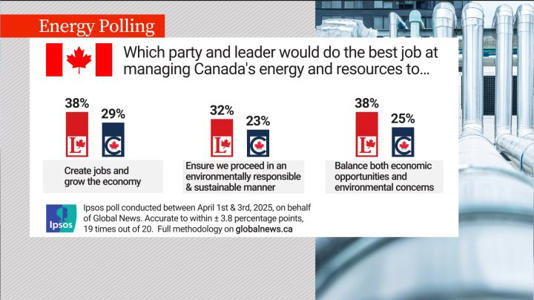Global News
Ipsos poll suggests unexpected support for Liberal energy strategy — but doubts remain
With Canada's future relationship with the United States dominating the federal election campaign, a new poll provides insight into which political party Canadians believe is best suited to manage the country's resources—an essential aspect of our economic relationship with the U.S.
In an Ipsos poll commissioned exclusively for Global News, a majority of respondents indicated that they believe the federal Liberals, led by Mark Carney, are better equipped to manage Canada's energy and resources than the Conservatives, led by Pierre Poilievre. Specifically, 69 percent of those surveyed stated that Canada needs to "act faster on opportunities for developing energy and resource projects in light of the dispute with the U.S." This includes 26 percent who agreed that we need to "push obstacles out of the way" and 43 percent who felt we should proceed more quickly, but with "some caution."
When asked which party and leader would best manage Canada's energy and resources to "create jobs and grow the economy" while ensuring an "environmentally responsible and sustainable manner," more respondents favored Mark Carney and the federal Liberals (38 percent) over Pierre Poilievre and the Conservatives (25 percent).
Kyle Braid, senior vice-president of Ipsos Public Affairs, noted, "It shouldn't be surprising that the Liberals lead on energy issues related to the environment. What may surprise the Conservatives is that the Liberals are actually leading on effectively managing energy to create jobs and grow the economy."
Braid added, "It's surprising because this has been a core issue for the Conservatives for years. Canadians seem to want growth in these industries, yet they appear to prefer the balanced approach of the Liberals over the Conservatives' aggressive strategies."
The poll results indicate that Carney and the Liberals lead Poilievre and the Conservatives across all categories and demographics, except in Alberta. In Alberta, more respondents believed that the Conservatives would better balance economic opportunities with environmental concerns (41 percent for the Conservatives versus 37 percent for the Liberals). However, the 4-point spread is smaller than Braid expected.
"One of the surprises here is that even in Alberta, while the Conservatives are viewed as better at handling these issues than the Liberals, the gap is only 4 points," said Braid. "Historically, that gap would typically be much larger—usually around 20, 30, or even 40 points. This indicates a shift for the Liberals overall, which is evident in the energy sector."
Although energy issues have attracted more attention since Donald Trump's election and his complaints about the U.S. balance of trade with Canada, only 4 percent of Canadians identified energy as a top issue in the federal election campaign. Braid commented, "So it's not decisive for voters yet."
He believes the Conservatives have an opportunity to change that during the upcoming federal leaders' debates. "The Conservatives need to find a way to revive their campaign. They have been trying to differentiate themselves from the Liberals in their advertising and speeches, but it hasn't worked so far," added Braid.
These are some of the findings of an Ipsos poll conducted between April 1st and 3rd, 2025, on behalf of Global News. For this survey, a sample of n=1,000 Canadians aged 18+ was interviewed online, via the Ipsos I-Say panel and non-panel sources, and respondents earned a nominal incentive for their participation. Quotas and weighting were employed to balance demographics to ensure that the sample's composition reflects that of the adult population according to Census data and to provide results intended to approximate the sample universe. The precision of Ipsos polls which include non-probability sampling is measured using a credibility interval. In this case, the poll is accurate to within ± 3.8 percentage points, 19 times out of 20, had all Canadians been polled. The credibility interval will be wider among subsets of the population. All sample surveys and polls may be subject to other sources of error, including, but not limited to coverage error, and measurement error. Ipsos abides by the disclosure standards established by the CRIC, found here: https://canadianresearchinsightscouncil.ca/standards/




No comments:
Post a Comment